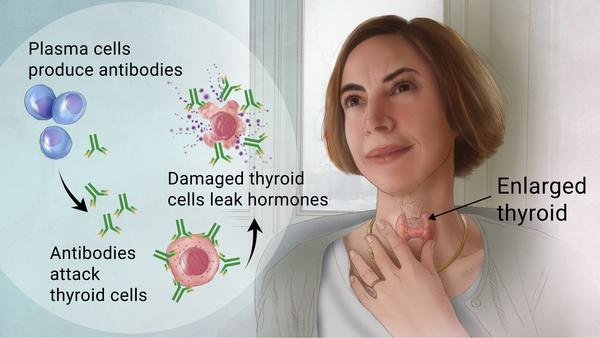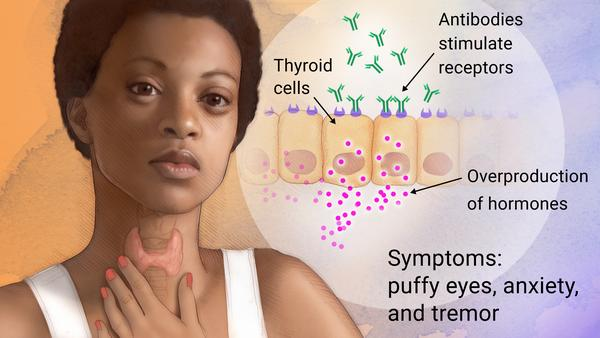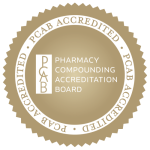Autoimmune diseases affect over 24 million Americans, with thyroid disease responsible for about 20 million cases.1 Autoimmune thyroid diseases can be underdiagnosed and many people may not know that they are affected. Do not let that scare you!1 Look no further to learn about autoimmune thyroid diseases, risk factors, and the importance of early diagnoses.What are autoimmune thyroid diseases?1-3Our immune systems are largely responsible for protecting us from infection, toxins, and other foreign substances. Autoimmune diseases like rheumatoid arthritis and lupus occur when the immune system begins to attack your body because it thinks your own cells are intruders and do not belong. The auto-antibodies produced cause inflammation and damage your body’s tissues, organs, and hormone production. When this occurs at the level of the thyroid, a butterfly-shaped gland at your neck, it can cause several effects to increase or decrease thyroid hormones. The thyroid’s job is to regulate your mood, metabolism, temperature, heart rate, breathing, and growth. The two chief autoimmune thyroid diseases include Hashimoto’s thyroiditis and Graves’ disease. Medical professionals and scientists are unsure why exactly these conditions occur, but they believe a dysfunctional immune system is a key cause.Hashimoto’s thyroiditis causes hypothyroidism or a decrease in thyroid hormone production. With Hashimoto’s thyroiditis, your body thinks your thyroid cells are foreign invaders. The immune system sends thyroid peroxidase antibodies (TPOAb) to attack your thyroid with the goal of weakening and killing the ‘foreign invaders.’ If you develop Hashimoto’s thyroiditis, you may experience the following signs and symptoms: enlarged thyroid or goiter, weight gain, muscle pain, depression, hair loss, brittle nails, constipation, swollen face, and cold sensitivity.  Graves’ disease results in hyperthyroidism or an increase in thyroid hormone production. In Graves’ disease, the body spontaneously attacks itself and produces an antibody known as thyrotropin receptor antibody (TRAb) that stimulates thyroid hormone production. This results in an excess of thyroid hormones and inflammation of the thyroid. Common signs and symptoms include insomnia, anxiety, weight loss, goiter, irregular menstrual cycle, rapid heartbeat, frequent bowel movements, bulging eyes, fatigue, and heat sensitivity or increased sweating.
Graves’ disease results in hyperthyroidism or an increase in thyroid hormone production. In Graves’ disease, the body spontaneously attacks itself and produces an antibody known as thyrotropin receptor antibody (TRAb) that stimulates thyroid hormone production. This results in an excess of thyroid hormones and inflammation of the thyroid. Common signs and symptoms include insomnia, anxiety, weight loss, goiter, irregular menstrual cycle, rapid heartbeat, frequent bowel movements, bulging eyes, fatigue, and heat sensitivity or increased sweating.  It is important to note that these symptoms develop slowly over time, so talk with your doctor or pharmacist if you experience them. Your doctor may decide to run thyroid hormone and antibody blood tests, and inspect your thyroid to determine if you have an autoimmune thyroid disease.Risk Factors for Autoimmune Thyroid Diseases2-8
It is important to note that these symptoms develop slowly over time, so talk with your doctor or pharmacist if you experience them. Your doctor may decide to run thyroid hormone and antibody blood tests, and inspect your thyroid to determine if you have an autoimmune thyroid disease.Risk Factors for Autoimmune Thyroid Diseases2-8
- Autoimmune disease – If you have a current autoimmune disease like Type 1 diabetes, this increases your risk of having an autoimmune thyroid disease. This is the primary risk factor because if your immune system is already not functioning properly, then it may cause other organs and glands to malfunction. Therefore, it is important that you regularly visit your doctor to check your thyroid gland functioning and know the symptoms.
- Sex – Females are more likely to develop autoimmune thyroid diseases than males as it occurs in one out of eight females. They are more likely to develop after pregnancy or menopause due to hormonal imbalances like with estrogen, the main female sex hormone. A thyroid disorder can cause irregular periods or menopause symptoms like hot flashes and mood swings, so contact your doctor or pharmacist if you experience these symptoms. Yet, males with low testosterone levels, the main male sex hormone, have a higher risk of autoimmune thyroid diseases too.
- Age – Although Hashimoto’s thyroiditis and Graves’ disease can occur at any age, they are most commonly developed between the early 40s and 60s. This is because the body undergoes many changes as we continue to age which can affect our hormone levels and regulation processes. Sadly, these conditions may be harder to diagnose as we age because of a lack or overlap of symptoms between the conditions.
- Chronic stress – As the amount of chronic stress you are under over a long period of time increases, you have a higher chance of developing a thyroid disorder. Examples of chronic stress include job loss, death of a loved one, marriage, depression, anxiety, and financial instability. The increase in cortisol or the body’s stress hormone inhibits the production of thyroid hormones which can lead to Hashimoto’s thyroiditis. Even infections can affect your thyroid functioning. Increased stress can lead to reactivation of viruses that may have been inactive in your body like Epstein-Barr virus or mononucleosis. This is why it is crucial that you manage your stress with activities like mediation or walking and visit your doctor regularly.
- Food sensitivity – Food sensitivities like with gluten and inflammatory foods such as processed foods increase inflammation and antibody production in your body. This can lead to thyroid dysfunction if your thyroid is attacked. Gluten is one of the most common food sensitivities and affects about 15% of the United States population. It is a protein found in wheat, barely, rye, and oats that make up common foods such as pasta, beer, and bread. If you have a food insensitivity and eat that food, the food tricks your body into thinking that it is harmful. This causes your body to make antibodies and become inflamed to fight it off that can lower your thyroid’s hormone production. Removing these foods from your diet may improve your thyroid functioning.
- Toxins or radiation – Exposure to toxins like pesticides, excess contrast dyes like iodine from x-rays, mercury, and radiation can cause your thyroid to release minimal thyroid hormones. This leads to poor metabolism, fatigue, and weight gain that are signs of Hashimoto’s thyroiditis. Minimizing your exposure to these harmful chemicals may benefit your overall energy, development, and body process regulations.
- Heredity – Unfortunately, we cannot change our family history or genes, but this may play a role in autoimmune thyroid disease. If someone in your family like your sister, grandfather, or mother has Hashimoto’s thyroiditis or Graves’ disease, then you have a higher chance of developing the condition.
- Milas K. Risk factors of Hashimoto’s Thyroiditis. Endocrineweb website. https://www.endocrineweb.com/conditions/hashimotos-thyroiditis/risk-factors-hashimotos-thyroiditis. Accessed August 1, 2021.
- Hashimoto’s disease. Mayo Clinic website. https://www.mayoclinic.org/diseases-conditions/hashimotos-disease/symptoms-causes/syc-20351855. Accessed August 1, 2021.
- Graves’ disease. Mayo Clinic website. https://www.mayoclinic.org/diseases-conditions/graves-disease/symptoms-causes/syc-20356240. Accessed August 1, 2021.
- Seed S. What is autoimmune thyroiditis? WebMD website. https://www.webmd.com/women/whatis-autoimmune-thyroiditis. Accessed August 1, 2021.
- Grunewald J. Why do thyroid disorders affect women more often than men? Experience Life website. https://experiencelife.lifetime.life/article/why-do-thyroid-disorders-affect-women-more-often-than-men/. Accessed August 1, 2021.
- Older patients and thyroid disease. American Thyroid Association website. https://www.thyroid.org/thyroid-disease-older-patient/. Accessed August 1, 2021.
- Klimenko E. Functional medicine approach to autoimmune thyroid disease. Dr. Klimenko website. https://www.drelenaklimenko.com/autoimmune-thyroid-disease/. Accessed August 1, 2021.
- Hyman M. A 7-step plan to boost your low thyroid and metabolism. Dr. Hyman website. https://drhyman.com/blog/2010/05/20/a-7-step-plan-to-boost-your-low-thyroid-and-metabolis/#close. Accessed August 1, 2021.



